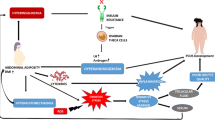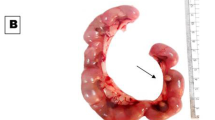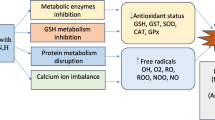Abstract
Zinc (Zn) is an essential trace element for human growth and its deficiency causes huge health impacts. The present study was conducted to examine the mechanisms by which Zn-deficient diet impairs reproductive function and its reversibility. Hence, SPF grade male Kunming (KM) mice were divided into three groups. Zn-normal diet group (ZN group) was provided with Zn-normal diet (Zn content = 30 mg/kg, DY19410Y) for 8 weeks. Zn-deficient diet group (ZD group) was provided with Zn-deficient diet (Zn content < 1 mg/kg, DY19401) for 8 weeks. Zn-deficient and Zn-normal diet group (ZDN group) was provided with 4 weeks Zn-deficient diet followed by 4 weeks Zn-normal diet. After 8 weeks, the overnight-fasted mice were sacrificed, and blood and organs were collected for further analysis. The results showed that Zn-deficient diet caused testicular structural disorders, decreased semen quality, imbalance in zinc homeostasis, and impaired autophagy. Semen quality, testosterone, serum Zn, testicular tissue Zn, testicular free Zn ions, alkaline phosphatase (ALP), zinc transporter 7(ZnT7), Beclin1, autophagy-related 5(ATG5), and the ratio of light chain 3(LC3) II/LC3I were significantly decreased, and ZnT4, Zrt-, Irt-like protein7 (ZIP7), and ZIP13 expression were significantly increased in ZD group mice, while the changes in above indicators caused by Zn-deficient diet were significantly alleviated in the ZDN group. It was concluded that Zn-deficient diet causes testicular structural disorders and decreased semen quality by causing imbalances in Zn homeostasis and impaired autophagy in male mice. Reproductive damages caused by Zn-deficient diet are reversible, and Zn-normal diet can alleviate them.




Similar content being viewed by others
Data Availability
The datasets used and/or analyzed during the current study are available from the corresponding author on reasonable request.
References
Glutsch V, Hamm H, Goebeler M (2019) Zinc and skin: an update. J Dtsch Dermatol Ges 17(6):589–596
Chasapis CT, Ntoupa PA, Spiliopoulou CA, Stefanidou ME (2020) Recent aspects of the effects of zinc on human health. Arch Toxicol 94(5):1443–1460
Chu A, Holdaway C, Varma T, Petocz P, Samman S (2018) Lower serum zinc concentration despite higher dietary zinc intake in athletes: a systematic review and meta-analysis. Sports Med 48(2):327–336
Huang T, Yan G, Guan M (2020) Zinc homeostasis in bone: zinc transporters and bone diseases. Int J Mol Sci 21(4):1236
Chu Q, Chi ZH, Zhang X, Liang D, Wang X, Zhao Y, Zhang L, Zhang P (2016) A potential role for zinc transporter 7 in testosterone synthesis in mouse Leydig tumor cells. Int J Mol Med 37(6):1619–1626
Zhang X, Guan T, Yang B, Chi Z, Wang ZY, Gu HF (2018) A novel role for zinc transporter 8 in the facilitation of zinc accumulation and regulation of testosterone synthesis in Leydig cells of human and mouse testicles. Metabolism 88:40–50
Bulldan A, Dietze R, Shihan M, Scheiner-Bobis G (2016) Non-classical testosterone signaling mediated through ZIP9 stimulates claudin expression and tight junction formation in Sertoli cells. Cell Signal 28(8):1075–1085
Croxford TP, McCormick NH, Kelleher SL (2011) Moderate zinc deficiency reduces testicular Zip6 and Zip10 abundance and impairs spermatogenesis in mice. J Nutr 141(3):359–365
Zhu X, Yu C, Wu W, Shi L, Jiang C, Wang L, Ding Z, Liu Y (2022) Zinc transporter ZIP12 maintains zinc homeostasis and protects spermatogonia from oxidative stress during spermatogenesis. Reprod Biol Endocrinol 20(1):17
Wang M, Zeng L, Su P, Ma L, Zhang M, Zhang YZ (2022) Autophagy: a multifaceted player in the fate of sperm. Hum Reprod Update 28(2):200–231
Huang Q, Liu Y, Zhang S, Yap YT, Li W, Zhang D, Gardner A, Zhang L, Song S, Hess RA, Zhang Z (2021) Autophagy core protein ATG5 is required for elongating spermatid development, sperm individualization and normal fertility in male mice. Autophagy 17(7):1753–1767
Gao F, Li G, Liu C, Gao H, Wang H, Liu W, Chen M, Shang Y, Wang L, Shi J, Xia W, Jiao J, Gao F, Li J, Chen L, Li W (2018) Autophagy regulates testosterone synthesis by facilitating cholesterol uptake in Leydig cells. J Cell Biol 217(6):2103–2119
Liu S, Huang L, Geng Y, He J, Chen X, Xu H, Li R, Wang Y, Ding Y, Liu X (2017) Rapamycin inhibits spermatogenesis by changing the autophagy status through suppressing mechanistic target of rapamycin-p70S6 kinase in male rats. Mol Med Rep 16(4):4029–4037
Bian X, Teng T, Zhao H, Qin J, Qiao Z, Sun Y, Liun Z, Xu Z (2018) Zinc prevents mitochondrial superoxide generation by inducing mitophagy in the setting of hypoxia/reoxygenation in cardiac cells. Free Radic Res 52(1):80–91
Liuzzi JP, Narayanan V, Doan H, Yoo C (2018) Effect of zinc intake on hepatic autophagy during acute alcohol intoxication. Biometals 31(2):217–232
Kawamata T, Horie T, Matsunami M, Sasaki M, Ohsumi Y (2017) Zinc starvation induces autophagy in yeast. J Biol Chem 292(20):8520–8530
Bucci MD, Weisenhorn E, Haws S, Yao Z, Zimmerman G, Gannon M, Taggart J, Lee T, Klionsky DJ, Russell J, Coon J, Eide DJ (2018) An autophagy-independent role for ATG41 in sulfur metabolism during zinc deficiency. Genetics 208(3):1115–1130
Lee MG, Choi MA, Chae S, Kang MA, Jo H, Baek JM, In KR, Park H, Heo H, Jang D, Brito S, Kim ST, Kim DO, Lee JS, Kim JR, Bin BH (2019) Loss of the dermis zinc transporter ZIP13 promotes the mildness of fibrosarcoma by inhibiting autophagy. Sci Rep 9(1):15042
Beigi Harchegani A, Dahan H, Tahmasbpour E, Bakhtiari Kaboutaraki H, Shahriary A (2020) Effects of zinc deficiency on impaired spermatogenesis and male infertility: the role of oxidative stress, inflammation and apoptosis. Hum Fertil (Camb) 23(1):5–16
Chen Y, Yang J, Wang Y, Yang M, Guo M (2020) Zinc deficiency promotes testicular cell apoptosis in mice. Biol Trace Elem Res 195(1):142–149
Omu AE, Al-Azemi MK, Al-Maghrebi M, Mathew CT, Omu FE, Kehinde EO, Anim JT, Oriowo MA, Memon A (2015) Molecular basis for the effects of zinc deficiency on spermatogenesis: an experimental study in the Sprague-dawley rat model. Indian J Urol 31(1):57–64
Fallah A, Mohammad-Hasani A, Colagar AH (2018) Zinc is an essential element for male fertility: a review of Zn roles in men’s health, germination, sperm quality, and fertilization. J Reprod Infertil 19(2):69–81
Yakubu MT, Oyeyipo TO, Quadri AL, Akanji MA (2013) Effects of aqueous extract of Musa paradisiaca root on testicular function parameters of male rats. J Basic Clin Physiol Pharmacol 24(2):151–157
Yan L, Yue D, Luo H, Jin X, Xu X (2010) Effect of vitamin E supplementation on the enzymatic activity of selected markers in Aohan fine-wool sheep testis. Anim Reprod Sci 122(3–4):264–269
Henshall SM, Afar DE, Rasiah KK, Horvath LG, Gish K, Caras I, Ramakrishnan V, Wong M, Jeffry U, Kench JG, Quinn DI, Turner JJ, Delprado W, Lee CS, Golovsky D, Brenner PC, O’Neill GF, Kooner R, Stricker PD, Grygiel JJ, Mack DH, Sutherland RL (2003) Expression of the zinc transporter ZnT4 is decreased in the progression from early prostate disease to invasive prostate cancer. Oncogene 22(38):6005–6012
Baltaci AK, Yuce K (2018) Zinc transporter proteins. Neurochem Res 43(3):517–530
Tran S, Fairlie WD, Lee EF (2021) BECLIN1: protein structure, function and regulation. Cells 10(6)
Kabeya Y, Mizushima N, Ueno T, Yamamoto A, Kirisako T, Noda T, Kominami E, Ohsumi Y, Yoshimori T (2000) LC3, a mammalian homologue of yeast Apg8p, is localized in autophagosome membranes after processing. EMBO J 19(21):5720–5728
Liuzzi JP, Yoo C (2013) Role of zinc in the regulation of autophagy during ethanol exposure in human hepatoma cells. Biol Trace Elem Res 156(1–3):350–356
Cho HM, Ryu JR, Jo Y, Seo TW, Choi YN, Kim JH, Chung JM, Cho B, Kang HC, Yu SW, Yoo SJ, Kim H, Sun W (2019) Drp1-Zip1 interaction regulates mitochondrial quality surveillance system. Mol Cell 73(2):364–376
Funding
This study was sponsored by S&T Program of Hebei (grant no. 20377715D; 21377796D) and Hebei Natural Science Foundation (grant no. H2021314001).
Author information
Authors and Affiliations
Contributions
Bo Sun, Liger Te, Xin Zuo, Junsheng Liu, Yuejia Li, and Jiajie Bi collected the samples and performed the experiments. Bo Sun and Jing Ma analyzed the data and wrote the manuscript. Jing Ma and Shusong Wang conceived the idea, designed the study, collected the funds, and revised the manuscript. All authors read and approved the final version of the manuscript.
Corresponding author
Ethics declarations
Competing Interests
The authors declare no competing interests.
Ethics Approval
All animal experiments were conducted according to the ethical guidelines of ethics committee of the Hebei Institute of Reproductive Health Science and Technology.
Conflict of Interest
The authors declare no competing interests.
Additional information
Publisher's Note
Springer Nature remains neutral with regard to jurisdictional claims in published maps and institutional affiliations.
Rights and permissions
About this article
Cite this article
Sun, B., Ma, J., Te, L. et al. Zinc-Deficient Diet Causes Imbalance in Zinc Homeostasis and Impaired Autophagy and Impairs Semen Quality in Mice. Biol Trace Elem Res 201, 2396–2406 (2023). https://doi.org/10.1007/s12011-022-03324-1
Received:
Accepted:
Published:
Issue Date:
DOI: https://doi.org/10.1007/s12011-022-03324-1




